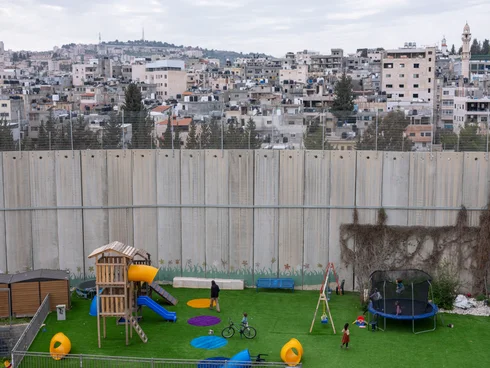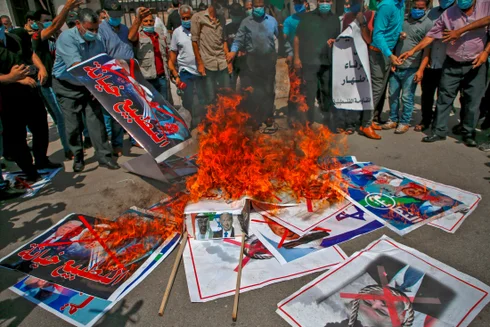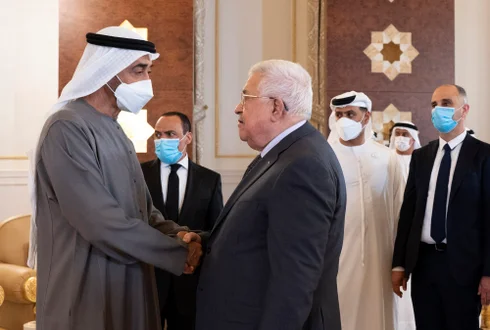T. Belman. I hope her worst fears come true. She is obsessed with the poor Palestinians and is begging for someone to help them.
“That’s why U.S. leadership is needed: either to encourage inclusion efforts, or to encourage the Arab states to condition further normalization with Israel on concessions – or even just further confidence building measures – for the Palestinians. But the Biden administration so far has demonstrated no interest in “pushing” Israel.”
I am disgusted by this. Haaretz is committed to the Palestinian clause and against the Zionist project.
No one expects Biden to spend political capital (or even much time) on the Israeli-Palestinian conflict during his upcoming Mideast trip. But as Israel and its new Gulf allies fast-track ties, excluding the Palestinians feeds disturbing trends
By Dahlia Scheindlin, HAARETZ 5.7.22
The Abraham Accords of 2020, normalizing relations between Israel and four Arab countries, was a triumph for Israel but represented bitter lemons for Palestinians. The deals ripped up any residual solidarity that Arab nations once sought to convey for the plight of Palestinians. Any incentives for Israel’s leadership to advance a future peace, or even slow its expanding control over Palestinians, appeared to vanish.
America is proud of its role as a broker of these accords. The United States is also formally committed to a negotiated resolution of the Israeli Palestinian conflict through a two-state solution. But with President Joe Biden’s Middle East visit now imminent, no one expects him to spend political capital (or even much time) on the intractable cause of Israeli-Palestinian peace.
But the contradiction between America’s stated aim of Israeli-Palestinian peace and the administration’s complacence is damaging in itself.
America’s regional credibility is already under strain in the Middle East, both historically and following the ill-fated withdrawal from Afghanistan last year. With the war in Ukraine, America should be falling over itself to demonstrate commitment to the rules-based post-war order. Instead, between the 2003 Iraq war, stalwart support for Israel’s policies, recognition of Morocco’s sovereignty over Western Sahara and Israeli sovereignty over the Golan Heights, the Middle East is where American idealism goes to die.
If the U.S. does wish to advance both Arab normalization with Israel and a negotiated resolution of the conflict with the Palestinians, it should scour the Abraham Accords for opportunities to support peace, however remote, rather than stamp it out.

Playground of Jewish settlers in the Rachel’s Tomb compound next to Israel’s concrete barrier, separating them from the West Bank city of Bethlehem in the background.Credit: AP Photo/Oded Balilty
The prospect looks far-fetched, to be sure. The Accords were born of Israeli, Emirati and American motives that have little to do with the Palestinians and everything to do with regional security alliances, geopolitical leverage, financial opportunity, and/or the naked political ambitions of the leaders involved.
Moreover, the Palestinian-Emirati relationship is abysmal. Animosity between Palestinian President Mahmoud Abbas and the UAE predates the accords, linked at least partly to Abu Dhabi’s embrace – and funding – of Abbas’ longtime rival Mohammed Dahlan. Normalization with Israel sparked a bitter sense of abandonment among Palestinians. For their part, the Emirati leadership says it staved off Netanyahu’s West Bank annexation plan, but (in their telling) ungrateful Palestinians rejected the deal, recalled their ambassadors to the UAE and Bahrain, just as the UAE was still smarting from the Palestinian rejection of its COVID vaccine aid earlier that year, a rejection linked to accelerating normalization ahead of the signing of the deal.
And yet, the same parties have interests in improved relations, too.
The poor state of ties between Ramallah and Abu Dhabi is not the final word on UAE-Palestinian relations, according to Moran Zaga, a lecturer at the University of Haifa and an expert on Gulf affairs.
Earlier this year, the Palestinian ambassadors returned to both Bahrain and the UAE, and Mahmoud Abbas himself paid a condolence call to the UAE’s freshly anointed president (but longtime power broker) Mohamed bin Zayed after his half-brother died. Lana Nusseibeh, the UAE’s permanent representative to the United Nations, hails from a Palestinian family, and has advocated repeatedly for Palestinians at the Security Council during the UAE’s rotating membership, in support for a Palestinian state and decrying Israel’s practices in Sheikh Jarrah. The UAE has criticized Israel’s actions in Jerusalem’s al-Aqsa mosque, said Zaga in an interview, with the double impact of supporting Palestinians while portraying itself as a defender of Islamic interests. “The [UAE] attitude is between realpolitik and [cultivating] the image of a humanitarian country trying to take care of Palestinians,” she said.
The UAE could also prefer a stronger Palestinian Authority, despite these tensions: Hamas and Islamic Jihad are supported by the UAE’s major rivals, Qatar and Iran. A weaker PA means stronger nodes of influence for Emirati nemeses, through Palestinian actors.
At the same time, some Palestinians are clear that they have much to gain from engaging with the Gulf states.
Dr. Samih Al-Abed, a former minister in the Palestinian Authority and a veteran Palestinian negotiator in the major rounds of peace talks in past years, said in an interview: “We would love the Abraham Accords to be part of the Arab peace initiative,” referring to the 2002 Saudi-led comprehensive Israeli-Palestinian peace initiative. He believed that Israel’s new and old Arab allies “are interested in solving this.”
Palestinian President Mahmud Abbas offers condolences to Sheikh Mohamed bin Zayed Al Nahyan, UAE President and ruler of Abu Dhabi, on the passing of the previous UAE president last month.Credit: Abdulla Al Neyadi/Ministry of Presidential Affairs via AP
His wish list includes Arab countries investing in Palestinian infrastructure projects, especially in Area C of the West Bank, to help halt Israel’s entrenchment there. The UAE should help with these investments: “We need new towns, highways, roads, to connect the areas, this is how you build a state,” he said, observing that such projects also create jobs for Palestinians, by Palestinians – mitigating economic dependency on Israel.
Israel might not appreciate its new Gulf allies assisting Palestinian development in Area C, where the right-wing is committed to Israeli control. But environmental projects could be less politically sensitive, and they are also tremendously urgent. In November 2021, Jordan, Israel and the UAE signed a major water desalination and green energy deal in November. That declaration of intent originated with a “Green Blue Deal” for the Middle East formulated by the veteran Israeli-Jordanian-Palestinian group EcoPeace.
Nada Majdalani, the Palestinian co-director of EcoPeace, told me she believes the Abraham Accords must be leveraged to push an end to occupation and a two-state solution. Still, she hopes such a water-energy deal could be replicated between Palestinians and Israelis. The group already has a plan to establish solar panel fields in South Hebron Hills, which could transmit energy through Israeli grids to Gaza, to power desalination, sewage treatment and Gaza’s water carrier system.
Here Israel would have clear incentives, said Majdalani. The project could advance Israel’s own green energy targets. Further, “The security establishment in Israel has finally recognized that water security in Palestinian areas comes with a clear security agenda for the Israeli people.” Untreated waste water in Gaza has caused pollution in Israel and suspended a desalination plant’s activity.
Gulf funding can help such a project through the Islamic Development Bank, Majdalani noted, ideally delivered with a strong political statement: “We want to cooperate on water and energy as a peace dividend, as the start of a new era for Palestinians and Israelis to discuss issues for the future of both people.”
Some have even more ambitious ideas: at Expo Dubai this year, Israel’s outgoing transportation minister pushed an existing, if futuristic-sounding idea of a Haifa-Dubai train route, which has included plans for a station in Jenin.
Such an initiative could advance both Israeli and Palestinian regional integration; Palestine also had a prominent booth at the Expo events.
Former U.S. Ambassador to Israel Dan Shapiro, now a Distinguished Fellow at the Atlantic Council, believes individuals and private sector initiatives are the routes through which the Accords can help the Israeli-Palestinian track. With Israelis and Palestinians distracted by internal political troubles, “The only potential source of positive energy for them in the region – which is not automatic, but it can be harnessed to improve dynamics – is the Abraham Accords,” he said in a phone interview.
Shapiro envisions Palestinian businesses integrated into Israeli joint ventures in the Middle East, while regular Palestinians and Israelis could “join education or training programs in health, water, and agrotech sectors.” Individual Palestinian participants would benefit, and such contacts could lead to healthy political conversations that might, eventually, help future political negotiations.
But all sides would need political will, Shapiro stressed, since the Palestinian leadership’s rejectionism could intimidate individuals. “It would help to have signals from Palestinian political leaders that this is considered legitimate, encouraged, welcomed,” he said, while the Abraham Accords partners would have to consciously invite them in.

Demonstrators burn pictures of Abu Dhabi Crown Prince Sheikh Mohammed bin Zayed al-Nahyan, Bahrain’s King Hamad bin Isa al-Khalifa, US President Trump, and Israeli Prime Minister Netanyahu at a Gaza protest against normalization. Credit: MOHAMMED ABED / AFP
Despite these varied opportunities, reality (or realpolitik) remains: Israel and the Gulf countries are unlikely to prioritize the Palestinians of their own volition; financial and military aims are still the overriding mutual interests. That’s why U.S. leadership is needed: either to encourage inclusion efforts, or to encourage the Arab states to condition further normalization with Israel on concessions – or even just further confidence building measures – for the Palestinians. But the Biden administration so far has demonstrated no interest in “pushing” Israel.
If nothing else, Biden and the U.S. must at a minimum rebuild Palestinian trust. The Palestinian sense of isolation and diplomatic paralysis is feeding disturbing trends: just 28 percent support a two-state solution in a new June survey, while 55 percent support return to armed confrontations and intifada. Sixty-five percent actually oppose dialogue with the Biden administration given the perception, as Samih al-Abed lamented, that the U.S. has done little to repair its relations with Palestinians following the tremendous damage of the Trump years.
Perhaps this is a time for gestures on a grand scale. Al-Abed ended the conversation with the wistful proposal for international recognition of the state of Palestine. Such a move, certainly from the U.S., seems far-fetched. But Israel got its peace adrenaline from the once-unthinkable Abraham Accords. With no hope on the horizon for Palestinians, the region will never know true peace, despite the glittering, highly-crafted messages of a “new” Middle East for the “children of Abraham.”
Dahlia Scheindlin is a political scientist and public opinion expert, and a policy fellow at The Century Foundation. Twitter: @dahliasc




Israel should pursue a policy of removing, with extreme prejudice, the leadership of any entity that supports the murder of her citizens. To make this statement seems redundantly obvious, but it seems to not be obvious enough for it to actually be current policy. Instead, Israel facilitates the transport of funding and building supplies into the Terrorist enclave of Hamastan to rebuild their tunnel systems, just as she provides massive loans to the PA to circumvent the ban on payments being paid to the families of terrorist having murdered Israelis. None of this should be acceptable, and instead of making nice with either of these two terrorist organizations, Israel should be taking the fight to them, both. Hamas should not be allowed to exist, or supported even with passive assistance of foreign financing and supplies. Likewise there should be no state assistance provided to improve the lives of the Arabs in the PA or elsewhere. If they are happy with their financial situation, well, it is a free country, but any financial incentives should be to assist the Arabs to self-evict towards lands outside of Israel, hopefully in Jordan under the auspices of a soon-to-be new management.
Meanwhile, Abu Mazen should not be protected by Israel to maintain the position he holds over his people. Rather, he should be forced to stand for election. For Israel to support a terrorist warlord to maintain an illegitimate dominion over the Arabs in the PA seems almost as counter intuitive as providing loans for them to pay their terrorist debts. The result of this will either be for another leader to be raised to replace that terrorist villain or the PA will erupt in a state of civil war. Honestly the later is more likely I think, and either the fighting among the clans will resolve to support a compromise leader, or they will break into a collection of rivaling entities – the latter would actually afford a far weaker PA with cause for some of them to potentially seek a real partnership with Israel to provide them an advantage over the others. Whatever they decide to do, as long as they maintain their bloodletting among their own people, their election process should be permitted to be resolved as they choose – sort of an Arab interpretation of Western democracy. If Hamas should move to overtake the PA, Israel should ravage them wherever they seek an abode, be it in Gaza, the PA or elsewhere.
Contingencies for whatever comes next would of course be necessary, but Israel has for too long held in place the pin which creates this false sense of complacency with regards to the dueling terrorist entities which are financed and maintained with Israel’s support, be it passive or active, even as these terrorist entities continue to attack the state, offset the stability of the lives of the people, and routinely choose to murder as many Israelis as they can. Their ability to affect a cost for their continued survival is not diminishing, in fact the potential of maintaining this state of permanent terrorist rivals has had the affect of increasing the threat against the Israeli people.
By ending the status quo, eliminating terrorist leadership and pursuing policies that would generally destabilize these twin states of terror, Israel would reestablish a sense of strength to replace the current call to guilt and weakness, while also destabilizing the terrorists in their own terrortory, requiring them to hide among the rats and generally upset their ability to carryout attacks against the innocents of Israel.
The status quo should be ended, and by doing so, it will also force Haaretz to finally find some new shtick upon which to write and bemoan.
How about pressuring Hamas and Fatah (i.e., the Palestinians) to end their war of annihilation against Israel?
HaAretz and the PLO are strange bedfellows, their main supporters are anti-semites that hate Israel bc it is “The Jewish State “
https://www.haaretz.com/israel-news/2022-07-05/ty-article/.premium/ben-jerrys-suing-unilever-to-block-sale-of-israeli-business/00000181-d011-d982-abb3-feb7d1b90000
F… Haaretz
F… Palestinians.